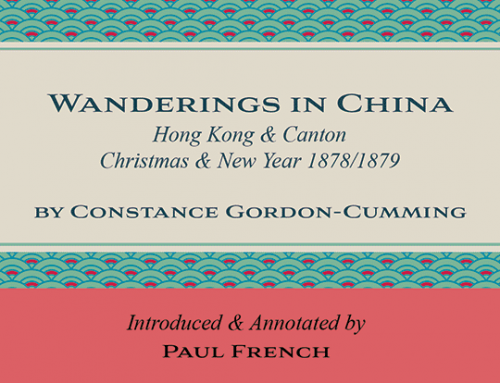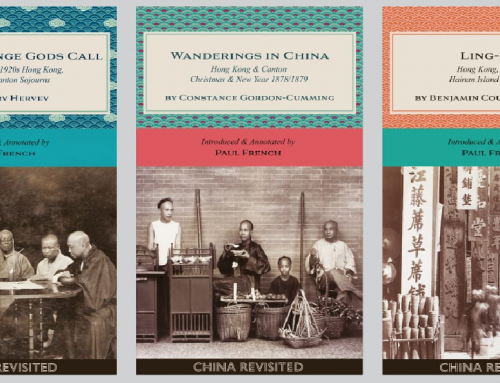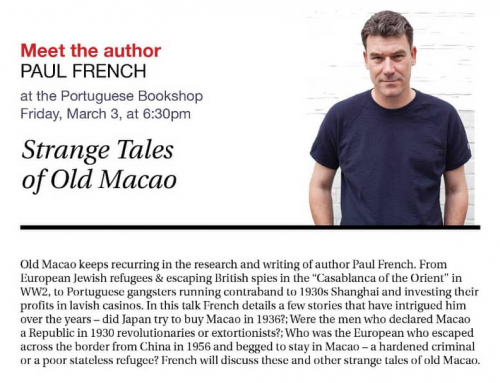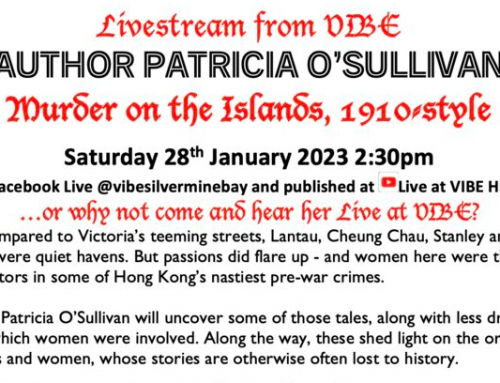Our author Rachel Cartland’s lunch speech at Hong Kong’s Foreign Correspondents’ Club a few weeks ago caused a fair amount of controversy, with an article in the next day’s South China Morning Post receiving lots of comments, many of them misconstruing the message in a variety of ways.
In the interest of clarity, below we print the full text of Rachel’s speech. You can alternatively watch the event on video.
Has Hong Kong Become Ungovernable?
My book Paper Tigress deals mainly with my career as an Administrative Officer in the Hong Kong Government which spanned the years 1972 to 2005. Nowadays, if I want a quick ego boost, I use the next taxi ride that I take as an opportunity to let slip that fact and sit back while the driver tells me how good things where when “you people” were in charge and how bad they are now. There is no doubt that a sort of rosy glow has settled over Hong Kong’s past and dark clouds over its present and future.
Looking back, I think that it was not all so easy. It was much more of “a damn near run thing” as the Duke of Wellington famously described victory at the Battle of Waterloo. There were not a few times when Hong Kong faced serious crises of governance. And now… I think that the situation is the same but different and, yes, unfortunately, overall, worse.
The Hong Kong that I came to in 1972 was a society that had been formed by the community’s reaction to the disturbances of 1967 when China’s Cultural Revolution had spilled over into Hong Kong. Television audiences around the world had seen streams of rioters trooping up the main streets to wave their Little Red Books at the gates of Government House. Hong Kong was written off as ungovernable internationally and indeed by many Hong Kongers who fled or pulled out their investments. The timorous were, of course, proved very wrong. I hesitate to say this here but one sided reporting may have played a part in this misjudgment. The ladies of The Helena May were requested not to take tea on the balcony because their calm presence did not give the right image for the photographs being taken from the US Consulate opposite. People who were here in those days emphasize that quality of cool determination: whether of the Police who squared up to the protesters with a ritual beating of batons on riot shields or in the great crowds of workers who, in the absence of public transport, walked quietly from North Point to Central every day. They also say that somehow from early on they knew that things were going to be “all right”. Perhaps that was the joy of hindsight but that underlying certainty that we could pull through crises of every kind is something that I used to notice and that is certainly missing now.
Like many who come to live here, I early on felt that Hong Kong had some special quality animating its crowded streets and misty mountains. I noticed, for example, that its destiny was governed by the “rule of the magical week-end”. This peculiar natural law was in essence that some tremendous crisis threatening the very existence of Hong Kong would brew to a climax over a week-end but by Monday would have been almost entirely dissipated, often at least partly thanks to some deft footwork by the Government.
The first time that I saw this put into effect was in September 1976. Chairman Mao had died on a Thursday but it was not until Saturday that the news reached us. Its rolled across the Colony like a cold wind of fear. Life seemed to slow down. I remember seeing a man standing with cap off and head bowed on a pedestrian bridge, as if stunned into immobility by the news. In a characteristic collision of the mores of East and West, the Governor, Sir Murray MacLehose, went to sign the condolence book in the Bank of China. Hong Kong held its breath and slowly exhaled. Just as with the 1967 confrontations, blind luck, the Hong Kong Government’s steady nerves and a determination by China not to upset the apple cart meant that we were not caught up in the excesses that followed on the Mainland in the wake of the trial of the “Gang of Four”.
A classic example of the Rule of the Magical Week-end came in October 1977, with the threat of a police mutiny. The ICAC had been already established for some three years but it had taken that long for the big, small and middling size crooks with corruption offences on their consciences to realise that now the Government really was serious and they might really be in trouble. The reaction came on a Friday with the storming of the ICAC Headquarters in Hutchison House by some dissident Police and a subsequent two days of anxiety as Hong Kong teetered on the brink of ungovernability. This time it was decisive action by the Government that ended the crisis, with the announcement of an amnesty for all but the most heinous bribery offences.
The 1970s were an action packed decade and the Dunkirk spirit that we kept in an office drawer was required as the first of thousands upon thousands of Vietnamese refugees arrived in leaking boats. I had a posting in the New Territories Administration and one of the projects that pre-occupied us was the removal of the illegal tanneries in the northern New Territories. Since the operators had great vats of acid to hand and no compunction about greeting unwelcome visitors with them this was no easy task but with the help of the Police Tactical Unit it was accomplished. That was a success story in our administration of the New Territories as indeed were the clearances and resumptions that made possible the building of the new towns. The New Territories has always been perhaps the most argumentative part of Hong Kong. It began in 1899 with armed resistance in Yuen Long and Hong Kong’s very own Six Days’ War. It could be said that we have subsequently always been too ready to make concessions to the villagers’ special status. Nonetheless, the New Territories of 2014 seems not so much ungovernable as ungoverned.
The Rule of the Magical Week-end came into operation twice more before the change of sovereignty. Once was in 1983 when a crisis of confidence led to a currency collapse but in the nick of time the Hong Kong Government and a young economist in the private sector worked out how the Hong Kong and US dollars might be tied to each other. The second was tinged with sadness as in 1989, the Tiananmen Square massacre deflated the Hong Kong community’s hopes for a more democratic China but again we were spared the most drastic consequences that were feared at the time, including the possibility of civil war ripping the country apart.
And then it all went wrong…..
After the Handover, the Government could still be efficient and effective as it proved during SARS and the Olympic equestrian events. It could still hold its nerve as it showed when it embarked on a massive purchase of Hong Kong stocks in response to the speculators’ raids. Somehow, though, the magic had gone.
The enchanted realm of olde Hong Kong was ruled by an essentially absurd and antediluvian system but it was one that had a logical consistency and coherence that made it function. I do not think either that we should under-estimate the contribution of its noble knights and ladies. People like Baroness Dunn, Sir Sydney Gordon, Sir Roger Lobo, Sir SY Chung and Sir YK Kan volunteered their time and considerable brainpower in the service of the community. There are similarly bright spots in today’s Executive Council but, overall, the comparison favours the days of yore.
Hong Kong boasts many excellent cultural productions and last year I attended one of these: Sleeping Beauty, a Christmas pantomime. As the witch hovered over the cradle of the little princess, “that is not good” my four year old granddaughter presciently observed. The infant Special Administrative Region was in its cradle almost seventeen years ago. The good godmothers heaped up gifts: the rule of law, a free press, a corruption free and efficient civil service and police. Then with a hiss and a snarl the evil or perhaps merely foolish godmother deposited on the top of the pile the most stupid and ridiculous constitution that any community has had to try to make work.
Within my time in Hong Kong we have gone from a Legislative Council wholly appointed by the Governor to one in which the entire membership stands ever poised to provide the disloyal Opposition to the Chief Executive who is specifically required to have no political party to support him. Within the Legislative Council there are representatives of the functional constituencies, some of which are rotten boroughs as bad and self-interested as anything that tainted nineteenth century England could come up with and directly elected members who get there thanks to a particularly peculiar proportional list system which ensures that more radical candidates will get a seat.
In some ways, what is amazing is how functional the place has remained regardless. One of the politics tutors from my old college loves visiting Hong Kong and among her reasons for this is that we are now a real life experiment for a political theory on the lines of “Voting systems don’t matter. What really counts is law and administration.” My own view is that here in our little Petri dish we have disproved that one. The strong foundations laid down before 1997 served us well and, to a certain extent, we have come to accept the new order of things but surely it cannot be a sane society in which a technical question like the issue of a new television licence becomes the subject of frenzied protests and a sleep in at Government offices. Many will say, of course, that the reason for the hysteria is the fear of the “dark forces” behind the scenes. Are these what is making Hong Kong ungovernable? I thought about this long and hard as I prepared for today. I still believe that in Hong Kong’s case this sort of amorphous uprising is not the right answer. I believe that a properly functioning ballot box democracy would give us tools enough to shed light on the murkiness that bedevils us now.
The Committee of the FCC gave me a topic rather like an exam question “Has Hong Kong Become Ungovernable?” Discuss. I looked at this through the prism of the past and the many recent crises that it has successfully weathered. I concluded that “Yes, it has become ungovernable, by reason of its hopelessly unwieldy political system.” Can things be put right? The current debate on democratic development is the obvious place for that to happen.
Hong Kong has to rediscover its gift of breathing together like one entity, to wait patiently and confidently and then to exercise wisdom, magnanimity and a touch of brio. Unfortunately, what we see in the media and on our streets does not inspire confidence that any of that is happening. It may be a charming idea to “Occupy Central with Love and Peace” but can it really be done without the risk of degenerating into violent confrontation?
On the other hand, the debate almost two years ago on National Education was encouraging: a revolt led by a fifteen year old schoolboy united the community and showed that a conservative and China leaning government could be responsive enough to make concessions. The reaction to the terrible attack on Kevin Lau showed that our core values are still on the side of the angels.
As you disperse to manage a hedge fund or whatever it is you do for the good of Hong Kong perhaps it is worth pondering the thought that, as before, Hong Kong must create its own luck and yet at the same time hope that the godmother of good fortune has at least one last magical gift to help us avoid ungovernability.






Leave a reply